Photos from the August 28, 2018 event The Whole World is Still Watching.
Chicago’s history is told through stories of protest

Chicago police came at crowds with nightsticks and tear gas as they tried to break up protests during the Democratic National Convention in Chicago in August 1968. | Paul Sequeira / Chicago Daily News
Chicago Sun-Times columnist Laura Washington highlights the UIC Great Cities Institute’s Aug. 28 event “The World is Still Watching” in her latest column, which reflects on the 1968 Democratic Convention protests and the need for protest today. Washington will serve as co-moderator for tomorrow’s event at UIC.
Protest still matters.
Fifty years ago, on the night of Aug. 28, 1968, thousands of young activists headed for downtown Chicago during the Democratic National Convention to protest the Vietnam War.
Richard J. Daley, the convention host and America’s most powerful mayor, wasn’t having any disruption to his plans to crown Hubert Humphrey as his party’s presidential nominee.
Daley dispatched battalions of police officers, the National Guard and the U.S. Secret Service. Appeals for peace were greeted by nightsticks and tear gas. Protestors were brutally beaten as they tried to exercise their First Amendment rights.
The police riot was televised, triggering outrage around the nation. Chicago political maven Don Rose coined the famous phrase, “The whole world is watching.”
New GCI Report: Policy Recommendations for Amendments to the State of Illinois Worker Cooperative Statute

Alex Linares, author of the report, will present his research at the Chicago Cooperative Alliance’s Chicago’s 1st Cooperative Economy Summit being held August 25.
We are pleased to release another report from the Great Cities Institute that we hope will be of value to those interested in promoting or establishing business cooperatives. We have long been proponents of worker cooperatives and small business incubators as a potential for addressing employment needs through a cooperative structure. One of the best models of worker cooperatives comes from the Basque region in Spain. The Mondragon Project goes back to the early 1940s. Ganados del Valle in New Mexico (now Tierra Wools) also has a long history as a successful cooperative based in the wool industry. Here in Chicago, the New Era Windows Cooperative is another example of successful worker ownership. Throughout the world and locally, interest in worker cooperatives is growing – both in urban and rural settings. Yet establishing the structure is not always easy and in some instances state law needs to be changed to either remove obstacles to cooperative formation or to create the necessary enabling legislation.
In this newest report from the Great Cities Institute, we share the results of extensive research on the relevant Illinois state statutes, including recent effort to improve state law, and conclude with policy recommendations for amendments to the State of Illinois Worker Cooperative Statute.
From the report summary:
Worker cooperatives are a business model where people employed in the business also receive dividends from the surplus earnings of the business, and have voting power within the business. It is a potential model for increasing wages, and instituting democratic values in the workplace. Illinois currently has two statutes on worker cooperatives, the Agricultural Co-operative Act (805 ILCS 315/1) and the Co-operative Act (805 ILCS 310/1).
This report gives an overview of what worker cooperatives are, reviews the Illinois Co-operative Act 805 ILCS 310/1, and makes recommendations for amending the Co-operative Act. Since this report focuses on worker cooperatives, it will not address the Agricultural Co-operative Act (805 ILCS 315/1) which organizes agricultural consumer cooperatives.
The Co-operative Act was amended in 2016 which modified the statute’s language to allow all types of businesses to be organized as worker cooperatives in Illinois. This was a milestone in allowing worker cooperatives to grow, especially within the service sector. Regardless, two elements from many other statutes organizing worker cooperatives are missing from the Illinois Co-operative Act.
- Inclusion of language that describes the distribution of earnings to cooperative members through patronage dividends or labor patronage
- Inclusion of more worker cooperative values in the statute language, specifically the voting system of one-member, one-vote.
Alex Linares, author of the report, will present his research at the Chicago Cooperative Alliance’s Chicago’s 1st Cooperative Economy Summit being held tomorrow, August 25, from 10:00 a.m. – 5:00 p.m. at 237 S. Desplaines St. At the same gathering, folks connected to the Illinois Worker Cooperative Alliance and the John Marshall Law School-Chicago Business Enterprise Law Clinic will also present their recent report, Cooperation Chicago: Building Chicago’s Worker Cooperative Ecosystem. Groups affiliated with the Alliance include: Chicago Community and Worker’s Rights (CCWR), Centro de Trabajadores Unidso: United Workers’Center (CTU), The Domestic Worker and Day Laborer Center of Chicago (DWDL), The Co-op Ed Center (CEC), and New Hope Rising.
Interest in the worker cooperative model is growing and we are pleased that, through this report, we can contribute to the many efforts that exist towards promoting worker cooperatives. We hope this report sheds light on the recent amendments (2016) that made the statute more supportive of service based cooperatives, while also recommending amendments in the statute to better integrate more social values into the statute.
On September 14-16, the Worker Cooperative National Conference will be held in Los Angeles, California.
Policy Recommendations for Amendments to the State of Illinois Worker Cooperative Statute
Executive Summary:
Worker cooperatives are a business model where people employed in the business also receive dividends from the surplus earnings of the business, and have voting power within the business. It is a potential model for increasing wages, and instituting democratic values in the workplace. Illinois currently has two statutes on worker cooperatives, the Agricultural Co-operative Act (805 ILCS 315/1) and the Co-operative Act (805 ILCS 310/1).
This report gives an overview of what worker cooperatives are, reviews the Illinois Co-operative Act 805 ILCS 310/1, and makes recommendations for amending the Co-operative Act. Since this report focuses on worker cooperatives, it will not address the Agricultural Co-operative Act (805 ILCS 315/1) which organizes agricultural consumer cooperatives.
The Co-operative Act was amended in 2016 which modified the statute’s language to allow all types of businesses to be organized as worker cooperatives in Illinois. This was a milestone in allowing worker cooperatives to grow, especially within the service sector. Regardless, two elements from many other statutes organizing worker cooperatives are missing from the Illinois Co-operative Act.
- Inclusion of language that describes the distribution of earnings to cooperative members through patronage dividends or labor patronage
- Inclusion of more worker cooperative values in the statute language, specifically the voting system of one member, one-vote.
Authors:
Alex Linares
Read the Full Report Here.
August 28th – The Whole World is Still Watching
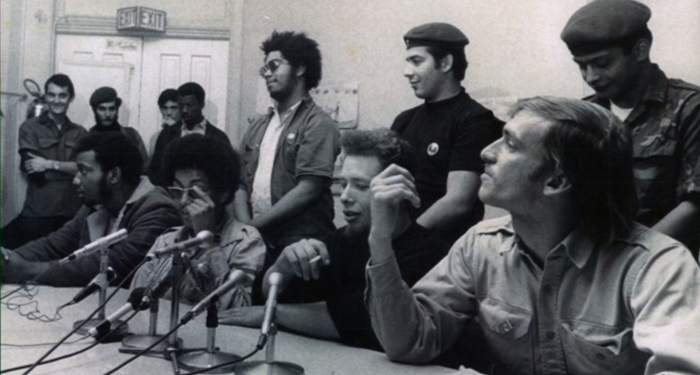
Rainbow Coalition press conference 1968 Fred Hampton (L), Cha Cha Jimenez next to Mike Klonsky (R).
It is very exciting to hear first-hand accounts of events or activities that are important to history. Please join us on Tuesday morning, August 28th, 2018 from 9:00 a.m. to noon to hear from people who were not only present in Grant Park on this day fifty years ago, but were organizers of the many protests that led up to the events surrounding the 1968 Democratic National Convention. You can RSVP here.
We are pleased that there are so many activities throughout the city and country recognizing this important moment in political history. We are especially pleased that we can feature organizers of the day who can provide the context and details of what was happening in the city and the country – indeed, throughout the world – in the years leading up to August 28, 1968 including civil rights efforts and protests of the war in Viet Nam. Don Rose, for example, was a local press secretary for Martin Luther King (when he came to Chicago) and “was an organizer and press spokesman for the National Mobilization Committee to End the War in Vietnam, which was the principal organizing group for the convention demonstrations.” In 1968, Mike Klonsky was the national secretary of the Students for a Democratic Society (SDS) and “played an active role in organizing the protests at the Democratic Convention in Chicago.” Marilyn Katz was a high school organizer of SDS and a leader of the Marshalls Squad.
Our guests – all still active today – will provide details on what happened in Lincoln and Grant Parks. José “Cha Cha” Jimenez and Billy “Che” Brooks were at the Convention protests “as participants being impacted.” Cha Cha, founder of the Young Lords and motivated by conditions in the Puerto Rican community in Lincoln Park, will speak on how the events surrounding the protests affected him and his work in the transformation of the Young Lords into a national human rights organization. Che will discuss his work with the education arm of the Black Panthers Party in Illinois. Mary Scott-Boria, a life-long resident of Chicago, was not at the convention, but will speak to the trajectory of her community service beginning in the 1960s with her anti-racism and racial justice work. Commissioner Jesus “Chuy” Garcia, a youngster at the time, remembers watching the tear gas and police beatings on TV and will share how the events of the 60s led to his own activism and community service that has lasted for decades.
Finally, collectively, panelists will discuss the constitutional rights of assembly and the role of social protest in a civil society. Following opening statements and a rich conversation among the panelists, the forum will open to a town hall format with questions and comments from those in attendance.
The moderators for the event are Laura Washington, Chicago Sun-Times columnist and ABC 7 Chicago political analyst, and Teresa Córdova, Director of UIC’s Great Cities Institute.
Please see bio’s below of our speakers.
We would also like to call your attention to another related event commemorating 50 years since the founding of the Young Lords being held at DePaul University September 21-23.
Earlier this year, we hosted another Fifty-year Commemoration event – the release of the Kerner Commission Report. You can see the full video of the event as well as a short video with some highlights.
We hope to see you next Tuesday at the University of Illinois at Chicago Student Center East, 750 S. Halsted, 9:00 a.m. – noon. Parking (for a fee) is available in the parking lot on Polk and Halsted (enter on Taylor Street). We are also up the street (south) from the UIC/Hasted stop of the Blue Line. RSVP here.
Bios of Panelists for The Whole World is Still Watching:
Don Rose is a political consultant heading Don Rose Communications and The Urban Political Group, and writes a weekly online column for the Chicago Daily Observer (CDOBS.com). The column won the Chicago Journalists Association award for commentary four times in the past six years. Based in Chicago, his consulting firms have operated in 13 states. Clientele has included Supreme Court justices, U.S. senators, governors, mayors and state and municipal legislators. Long active in the peace and civil rights movements he served as Dr. Martin Luther King’s Chicago press secretary during the civil rights leader’s campaign here and in 1968 was an organizer and press spokesman for the National Mobilization Committee to End the War in Vietnam, which was the principal organizing group for the convention demonstrations.
Mike Klonsky is a retired educator, author of several books on education reform and the co-founder and former director of the Small Schools Workshop. A national anti-war and civil rights activist in the ‘60s, he was the national secretary of the Students for a Democratic Society (SDS) in 1968. SDS was the largest militant student group in the country at that time and played an active role in organizing the protests at the Democratic Convention in Chicago. He was targeted for attack by the Justice Department under the government’s Operation COINTELPRO and arrested in a raid on the SDS office in 1969. He has stayed active in labor, civil rights, anti-war organizing since then. He’s now the co-host of Hitting Left radio show on WLPN FM in Chicago and blogs at Schooling in the Ownership and Mike Klonsky’s SmallTalk Blog. Mike received his Ph.D. in education from the University of Illinois at Chicago
Marilyn Katz is a writer, political and public policy strategist and activist who combined those skills in 1983, at the conclusion of Harold Washington’s successful run for mayor to create MK Communications, the firm of which she is president. Moved by actions of the civil rights activists in the south, as an undergraduate at Northwestern, she first joined SDS *Students for a Democratic Society) and very quickly went to uptown Chicago to organize for JOIN Community Union – an off-campus project of SDS. BY 1968 she was deeply embroiled in organizing high school students across the city, to oppose the war and racism and expand student and women’s rights. IT was this activity that led her to be a key organizer for the April 68 Chicago demonstrations against the war and to be a leader and deputy head of security for the demonstrators during the events of August 1968, Ms. Katz has been continuously active politically since that time, organizing the 2002 rally in Chicago at which Obama made his fateful anti-war speech and most recently being a founder of Chicago Women Take Action – a multi-racial, multi-generational organization striving for equity and equality for all women and their families.
José “Cha-Cha” Jiménez was the founder of the Young Lords as a national human rights organization. It was founded in the Lincoln Park neighborhood of Chicago on September 23, 1968. Cha-Cha was born in Caguas, Puerto Rico on August 8, 1948. He helped the Young Lords transform from a street gang into the Young Lords Organization and a component of the original Rainbow Coalition. YLO emerged onto the national political scene after they staged a series of grassroots actions on behalf of the poor people of Lincoln Park. They disrupted Lincoln Park Conservation Association meetings in Lincoln Park, confronted the real-estate brokers and landlords, created the Peoples Church and the Peoples Park, and forced the McCormick Theological Seminary to provide resources for the community. The Young Lords held the first large demonstrations in Chicago for Puerto Rican self-determination. Cha-Cha ran for alderman of the 46th Ward and garnered 39% of the vote, becoming the first Hispanic to run and oppose the Cook County Democratic political machine of Richard J. Daley.
Billy “Che” Brooks was Deputy Minister of Education of the Black Panther Party for Self-Defense (BPP) and the former director of YouthLAB@1521 through the Better Boys Foundation, retiring in 2015. In 1968, Che worked closely with BPP Chairman Fred Hampton who was the main spokesman of the Black Panther Party in Illinois. As one of the primary leaders of the BPP, Mr. Brooks was under constant, daily harassment by the Chicago Red Squad and Gang Intelligence Unit. He also worked closely with the Young Lords through the Rainbow Coalition. Currently, Brooks is facilitating a living history project at the Oak Park Library and is working with former BPP Party members to commemorate the fifty year inception of the founding of the Illinois Chapter of the Black Panther Party.
Mary Scott-Boria is a lifelong resident of Chicago, arriving to Chicago at 15 where she was immediately immersed in the Chicago Freedom Movement as a young activist. Immediately upon graduating from high school she joined the Black Panther Party where her activities led her to working with the Puerto Rican Socialist Party. Mary has over 50 years of experience and knowledge of Chicago’s communities, having worked as a professional social worker and human services administrator in several not for profit organizations. Her work and interests have been in women and youth issues and in community organizing and politics. She served as the first executive director of the Chicago Sexual Assault Services Network, director of Youth Services Project (YSP), a executive committee member of the Cook County Democratic Women, and most recently as director of the Urban Studies Program of the Associated Colleges of the Midwest. Mary holds a master’s degree in Social Work from the University of Illinois at Chicago. Her leadership in the Anti-Racism Institute of Clergy and Laity Concerned led her to seminary where she completed her Master of Divinity degree from the McCormick Theological Seminary in Chicago. She served on the training team of the Christian Peacemakers Teams and was most recently active with the Mikva Challenge Foundation and CLAIM (Chicago Legal Advocacy for Incarcerated Mothers).
Jesus “Chuy” Garcia is the outgoing District 7 representative on the Cook County Board of Commissioners in Illinois. He has long been involved in the politics of Chicago, serving as Alderman of the 22nd Ward on the Chicago City Council from 1986 to 1992 and District 1 representative in the Illinois State Senate from 1993 to 1999. Commissioner Garcia is a 2018 Democratic candidate seeking election to the U.S. House to represent the 4th Congressional District of Illinois. Garcia earned a B.S. in political science and a Master’s Degree in urban planning and policy from the University of Illinois at Chicago. His experience includes work as the founding executive director of the community development organization Enlace Chicago and service as the founding chair of the board for Latino Policy forum and as a member of the boards of Woods Fund Chicago and The Center on Leadership Innovation.
An Invisible Asset: The Calumet River on Chicago’s Southeast Side
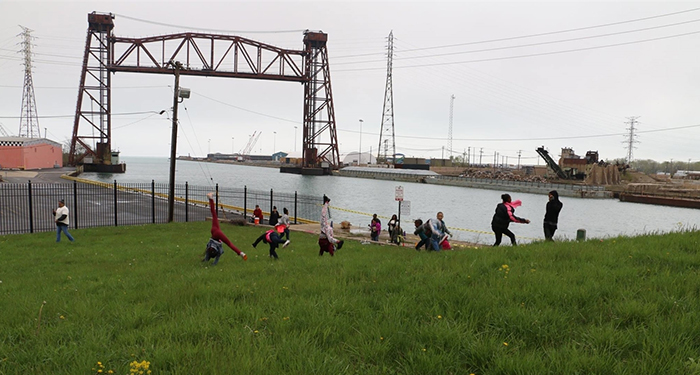
Calumet Connect; Julia Hunter, Work2gether4peace
Metropolitan Planning Council released a blog highlighting the Calumet Connect project and the work of GCI staff Jackson Morsey and Jack Rocha to engage residents, businesses, and community organizations in bringing more resources to the Southeast Side and utilizing the Calumet River as an asset for the communities.
The Calumet River is an invisible asset to most residents on Chicago’s southeast side. It unites the entire Calumet Region under its economic umbrella of heavy industry, yet physically divides many of its neighborhoods and is generally inaccessible to residents.
Jackson Morsey, an urban planner with the Great Cities Institute (GCI) at the University of Illinois at Chicago (UIC), recalls that residents hardly interact with the river.
“The Calumet River is essentially invisible to the surrounding communities and has prevented residents from perceiving it as a community asset,” Morsey says.
‘When Will the Punishment End?’: Formerly Incarcerated Women Rebuilding Their Lives
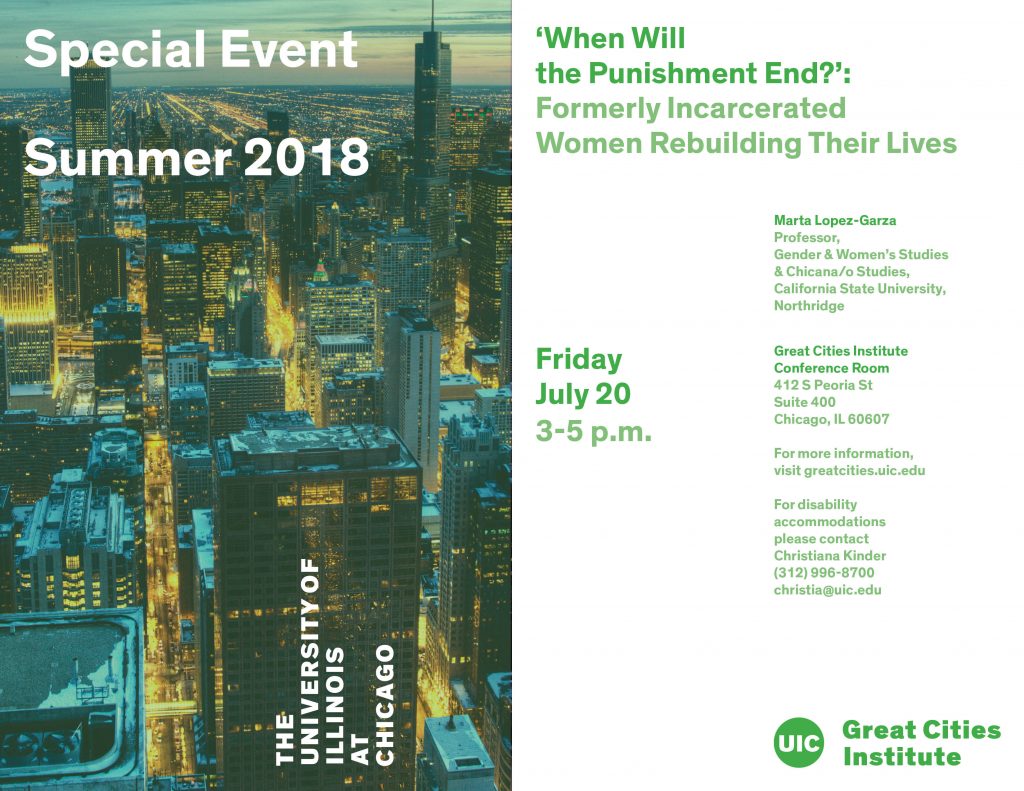
This talk will be about Professor Garza’s work with formerly incarcerated women in both the academic and community arenas. She will speak about a new organization of formerly incarcerated students at the CSUN campus along with her work in the Watts neighborhood of south Los Angeles with A New Way of Life and Susan Burton, a group of formerly incarcerated women activists who are not only committed to changing their lives but also, most importantly, changing the regressive policies at the state (California) and national levels. The CSUN student organization, Revolutionary Scholars, is composed of critically minded students who have networked with other formerly incarcerated students state and nationwide; and Susan Burton is the author of “Becoming Ms Burton,” and has been written about in many academic and scholarly publications, including Michelle Alexander’s “The New Jim Crow.”
Professor Marta López-Garza holds a joint position in Gender & Women’s Studies and Chicana/o Studies Departments at California State University, Northridge. She also co-directs Civil Discourse & Social Change, a campus wide Initiative combining education with avenues for community involvement and sustained activism.
López-Garza’s most current research is on formerly incarcerated women, the subject of her documentary “When Will the Punishment End?” which can be viewed on here. This film follows the women in their journey from prison back to their communities, and their attempts to rebuild their lives and reunite with their families.
Recent publications include:
- “Formerly Incarcerated Women Speak Out,” Journal of Progressive Human Services. 27: 2, 2016.
- “Exploring the Intersections between Scholarship and Activism: Our Journey from Community Concerns to Scholarly Work,” White Washing American Education: The New Culture Wars in Ethnic Studies, editors Tracy Buenavista, James R. Marin, Anthony J. Ratcliff, Denise M. Sandoval. Santa Barbara, CA and Denver, CO: Praeger Publishers/ABC-CLIO. coauthors, Mary Pardo and Yarma Velázquez Vargas, 2016.
- “Race Classification: The Question of Categorization and Claiming Indigeneity,” U.S. Latino Issues, 2nd Edition, editor Rodolfo Acuña. Santa Barbara, CA: Greenwood and ABC-CLIO Press, 2017.
- “Formerly Incarcerated Women: Stories of Returning Home, to Family and Community,” Research Justice: Methodologies for Change, editor Andrew Jolivette, Policy Press, Bristol, UK, 2015.
How Healthy is Lake Michigan? A Checkup on the Great Lakes
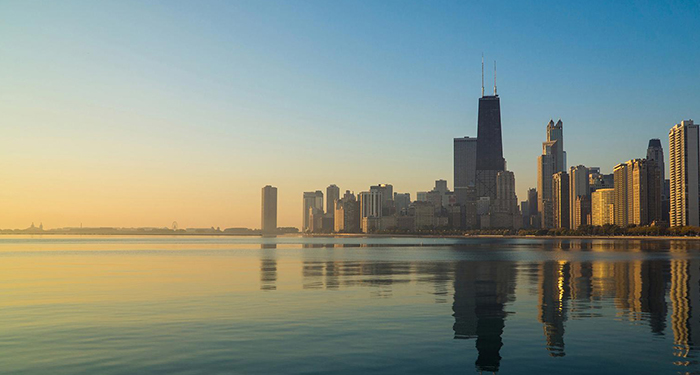
(Frank McNamara / Flickr)
Rachel Havrelock, GCI faculty affiliate, director of UIC’s Freshwater Lab and associate professor of English, was a featured panelist on WTTW-TV’s “Chicago Tonight” for a discussion about the health and maintenance of Lake Michigan.
“I definitely, in a very physical way, have been experiencing some of the negative factors in an otherwise really grand body of water,” said Rachel Havrelock, founder and director of The Freshwater Lab at the University of Illinois at Chicago.
Havrelock, a lifetime Great Lakes swimmer, says she recently experienced eye irritation after taking a swim at Oak Street Beach. She suspects it was a reaction to the runoff from excessive rain.
“We just get (hit) these days with a lot of water, pounding us very quickly,” she said. “We’ve got some big, decent infrastructure at play, but at the same time, the way the development is going–I would say we’re not doing very well when it comes to thinking about how to hold, how to store, and how to filter our rain water so that it doesn’t cause damage to people’s homes and lives.”
Wilson signs with North Carolina
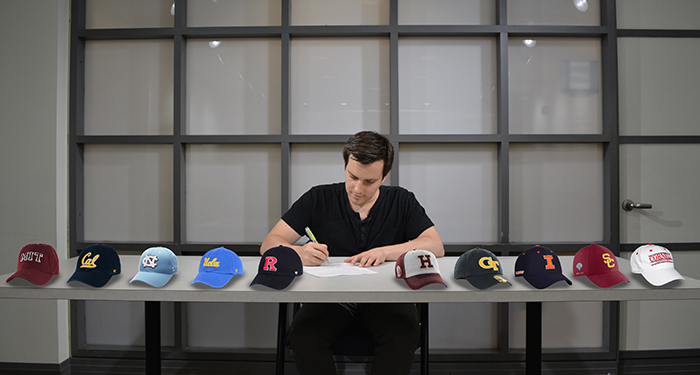
Hats represent top 10 planning schools as ranked by Planetizen.
Matt Wilson has signed with the University of North Carolina – to pursue his Ph.D.! We’re happy for him and the good news is that he will remain with Great Cities as a Senior Research Specialist continuing to work with us on youth employment, advanced manufacturing and workforce development. Please join us here at GCI on Thursday, July 26 from 3:00 p.m. – 5:00 p.m. for a gathering to bid good wishes to Matt.
Many of you might know Matt for his tremendous work on the GCI reports on joblessness among young people. Matt’s commitment to this issue and his skills as a data wonk and GIS specialist helped make these reports so significant. Matt was first author on our recent report, Industrial Restructuring and the Continuing Impact on Youth Employment in Illinois.
Matt was also a co-author along with Teresa Córdova and Andrew Stetner of The Century Foundation’s Rediscovering Government Initiative, entitled Revitalizing Manufacturing and Expanding Opportunities for Chicago’s Black and Latino Communities, released on June 7, 2018.
We also had the benefit of Matt’s involvement in many of our other projects including the Pilsen Quality of Life Plan, our evaluation work for the Chicago Cultural Alliance, and applying an economic hardship index (originally designed for regions and cities) to Chicago community areas to display inter-urban hardship and spatial inequality within Chicago using multiple indicators of hardship.
We are immensely grateful for his innovative spirit, hard work, long hours, good humor, acumen, fantastic disposition and deep commitment to the work of the Great Cities Institute.
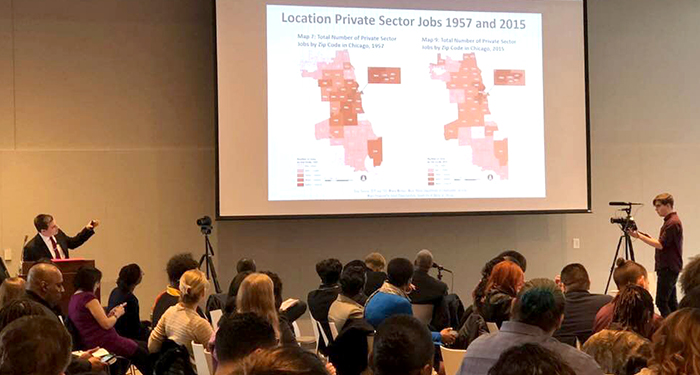
Matt presenting at youth employment hearing at Malcolm X College, March 1, 2018.
Matt will be pursuing a PhD in City and Regional Planning at the University of North Carolina at Chapel Hill under the direction of T. William (Bill) Lester. Dr. Lester was born in Chicago and is in the midst of research on “the long-term impacts of urban renewal polices on neighborhood economic development on Chicago’s South Side.”
We deeply love this young man and will miss seeing him on a daily basis. He remains part of the GCI team so you can expect to hear more from and about him.
Those of you who had regular contact with Matt will still be able to reach him on his cell phone and via email: Mwilso25@uic.edu
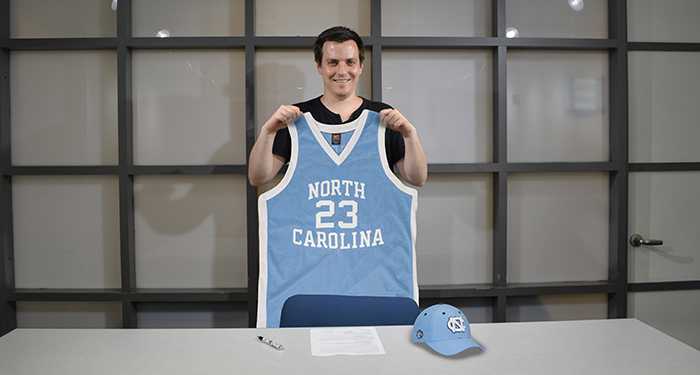
Revitalizing Manufacturing and Expanding Opportunities for Employment
We were delighted to see the Editorial in The Chicago Tribune on July 5, 2018 based on a June 7th report by the Great Cities Institute and The Century Foundation’s Rediscovering Government, entitled Revitalizing Manufacturing and Expanding Opportunities for Chicago’s Black and Latino Communities. This is a powerful report with an extensive amount of data and analyses of the state of manufacturing and employment in the Chicago region. The report also contains recommendations on how to match the need for workers in manufacturing with the needs for jobs in many Black and Latino communities. Manufacturing job training programs, particularly those oriented toward youth, such as Manufacturing Renaissance’s Manufacturing Connect, can help fill thousands of available manufacturing positions, while simultaneously reducing unemployment, stemming violence, and bringing more manufacturing businesses to the region.
The report asserts,
In this moment in Chicago’s economic history, there is an opportunity to revitalize the region’s recovering manufacturing sector with a more inclusive future. The sector faces critical challenges attracting a new generation of workers that can adapt to the advanced manufacturing workplace increasingly characterized by robotics and automation. The region also has high rates of joblessness among blacks and Latinos, particularly those living in highly segregated and disinvested neighborhoods. With a commitment to expand opportunities for education and job training, the manufacturing sector and these communities of color can simultaneously address their respective employment needs.
The Tribune Editorial also highlights key aspects of the report,
Yes, the steel mills are gone, but “The City That Works” is still “The City That Makes.” There’s something wrong with this picture, however. Last year in the Chicago area, there were two job openings for every hire, according to the study. At least 16,000 unfilled job openings involved work that required only a high school education. The jobs are there, but there aren’t enough qualified workers to fill them.
But guess what — the labor pool is there. In 2016, unemployment among African-Americans in Cook County stood at 15.5 percent, and 7.3 percent among Hispanics. The key, then, is to prepare those young people for jobs in manufacturing.
We remember what one youth told the Great Cities Institute for a youth joblessness report the group had published last year: “Everyone wants drugs and violence to stop. Well then … get us off the streets and get us into some work clothes, and you will see the change.” That’s a call to action that leaders in metropolitan Chicago should heed.
The Great Cities Institute/Century Foundation report, Revitalizing Manufacturing and Expanding Opportunities for Chicago’s Black and Latino Communities, co-authored by Teresa Córdova, Matthew D. Wilson and Andrew Stetner, was released at a Summit on June 7th, 2018 at the University of Illinois at Chicago. Local partners who joined us to sponsor the summit included Manufacturing Renaissance and the Chicago Federation of Labor. Key also in the organizing of the event was Brad Markel, Executive Director of the Industrial Union Council of the AFLCIO and Tom Croft, Executive Director of the Steel Valley Authority. Manufacturing employers, union leaders and workforce development professionals attended day-long event which also included remarks by State Treasurer, Michael Frerichs. The Summit, Inclusion and Industry 4.0, was the third in a series organized by High Wage America Campaign of the Century Foundation’s Bernard L. Schwartz Rediscovering Government Initiative directed by Jeff Madrick, who provided opening remarks at the Summit. “Industry 4.0 envisions a fourth industrial revolution that harnesses the power of technology and aims to place diverse communities at the heart of this transformation.” Local news outlets covered the event.
In an opinion piece published on June 7, 2018 in Crain’s: Chicago Business, Córdova and Stetner, referring to the region’s “segregated economic recovery and history of unequal opportunity,” remind us of the long-term impacts of deindustrialization in the region noting that many communities in the Chicago region are still experiencing the negative effects. “These communities stand to gain immensely from remedying the workforce mismatches plaguing Chicago’s manufacturing sector.” Reinvesting in education and job training programs is most certainly a key strategy for harnessing this opportunity as the region rekindles its manufacturing sector with clean industry and advanced technology.
Chicago Tribune Editorial: Wanted: Workforce for ‘The City That Makes Things’ »
Crain’s Chicago: Here’s who can fill Chicago’s manufacturing needs (Op-ed) »
Chicago Tribune: Is manufacturing the answer to the joblessness that plagues parts of Chicago? »

















































































































